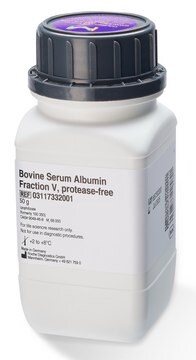A5611
Bovine Serum Albumin
Cohn Fraction V, lyophilized powder, ≥96% (agarose gel electrophoresis)
Synonym(s):
Albumin bovine serum, BSA, Bovine albumin
About This Item
Recommended Products
biological source
bovine
Quality Level
Assay
≥96% (agarose gel electrophoresis)
form
lyophilized powder
mol wt
~66 kDa
packaging
poly bottle of
origin
USA origin
technique(s)
immunohistochemistry: suitable
pH
4.8-7.5
solubility
H2O: soluble 40 mg/mL, clear to slightly hazy, yellow
UniProt accession no.
storage temp.
2-8°C
Gene Information
bovine ... ALB(280717)
Looking for similar products? Visit Product Comparison Guide
General description
Application
- for in vitro high molecular weight (HMW)-species formation assay
- for immunohistochemistry
- in Escherichia coli quantitative polymerase chain reaction (qPCR) analysis
Biochem/physiol Actions
Preparation Note
Storage Class Code
11 - Combustible Solids
WGK
WGK 1
Flash Point(F)
Not applicable
Flash Point(C)
Not applicable
Certificates of Analysis (COA)
Search for Certificates of Analysis (COA) by entering the products Lot/Batch Number. Lot and Batch Numbers can be found on a product’s label following the words ‘Lot’ or ‘Batch’.
Already Own This Product?
Find documentation for the products that you have recently purchased in the Document Library.
Customers Also Viewed
Our team of scientists has experience in all areas of research including Life Science, Material Science, Chemical Synthesis, Chromatography, Analytical and many others.
Contact Technical Service




